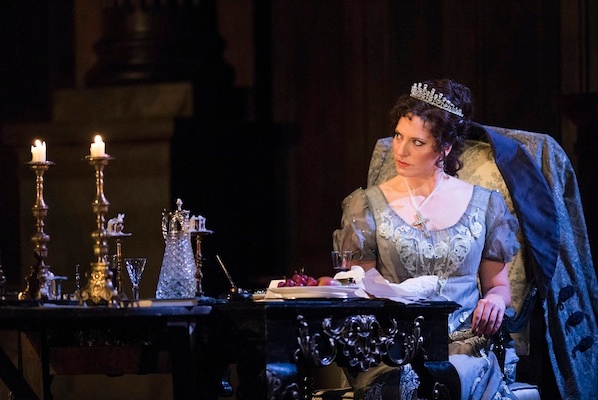George Benjamin’s Written on Skin is a work of compelling fascination, all the more so in that it is elusive and possibly wilfully puzzling. I want to see it again as soon as possible, and of how many new operas can that be said? Actually, of three that have been premièred at the Royal Opera in the past decade — Adès’s The Tempest, Birtwistle’s The Minotaur and now this, though it has already been performed in Europe. Three apparent masterpieces of opera from England in a decade is impressive, indeed unprecedented. And they are all quite different, with Skin being the most opaque, though the experience of sitting through it, just over an hour and a half, mercifully without an interval, may be the most intense. The text by Martin Crimp should be read first, not because the words aren’t easy to hear — Benjamin makes sure in his orchestration of that — but because, although the language is lucid, there is so much going on.
The action takes place eight centuries ago, but it is told from the point of view of the present, and the characters, primarily the Boy, the Protector and his wife Agnès, frequently include the narrative device of ‘says the Boy’, etc., though I am not completely convinced that this adds to the piece as much as it confuses. The Boy is recruited to write for the Protector a celebration of his (the Protector’s) greatness, on skin; but things get complicated, and Agnès, intrigued with the Boy’s work, becomes more intrigued by the Boy, and they have a brief, extremely intense sexual relationship, the upshot of which is that the Protector murders the Boy and forces Agnès to eat his cooked heart, which she is delighted to do. That is the bare skeleton, if that, of the story.
The performance is musically ideal, the composer conducting and the five singers all perfectly suited to their roles. The staging is more problematic. Vicki Mortimer’s designs were presumably worked out in collaboration with the director Katie Mitchell, who we know has a taste for elaboration. The set is divided into four parts on two levels. The left of the stage is some ghastly contemporary archive, with white strip lighting, where the chief characters get dressed and undressed, while archivists walk extremely slowly back and forth. After a bit I decided to devote my whole attention to the other side of the stage, a modest living-room of almost any period, and for Part 2 (of the three) a wood. Angels play a more decisive role than I have indicated, but their function here is even less clear than in Rilke’s poetry.
What makes the experience of Skin so much more involving and thrilling than I have indicated is the quality of the music. For anyone who doesn’t know Benjamin’s music, I can only say that it is unlike anyone else’s, but that his admiration for Debussy’s Pelléas and Berg’s Wozzeck is clear, to Pelléas in the conversational intimacy of most of the singing, to Berg in the rare but immense and disturbing eruptions, when the world seems blown apart. Christopher Purves, one of the great operatic artists of the present, is the complicated and dangerous Protector; Barbara Hannigan is the unbelievably pure-voiced Agnès, though she manages still to convey the intensity and maturity of her feelings; and Bejun Mehta, for me the finest living counter-tenor, is the Boy, consummate in his acting and capable of expressing vocally a vast range of feeling. The two other Angels, who briefly double as the Protector’s in-laws, are on the same level, though there isn’t a lot for them to do: Victoria Simmonds and Allan Clayton. Anyone with the least interest in contemporary opera of other than infantile minimalist varieties needs to see this while the chance is there.
Puccini’s Tosca, which alternates with Skin in the Royal Opera’s current period, has been called very many things, often sharply hostile; but ‘dull’ has never been among them, until now. The blame resides mainly with Maurizio Benini, the conductor. He has managed to retain the sleazy lushness of Pappano’s brilliant conducting last summer, but has lost the momentum, so that what is usually the almost intolerable thrust of Act II is replaced by a series of discrete episodes, while Act I just disintegrates.
The cast is not distinguished apart from the vile Scarpia of Michael Volle, which in a more exciting account of the score would rank with the most terrifying. He is so seedy that you can see the oil dripping from his filthy locks, and he has a superb voice for conveying all shades of menace. Amanda Echalaz, who has impressed me previously, was breathy and underpowered, her desperation in her scenes with Scarpia indistinguishable from her jealous tantrums with Cavaradossi. Not that this Cavaradossi would be worth wasting much adrenaline over. Though reasonably elegant of figure, Massimo Giordani is the generic Italian tenor, and no more. For once, the Royal Opera has let a revival lapse into routine.






Comments